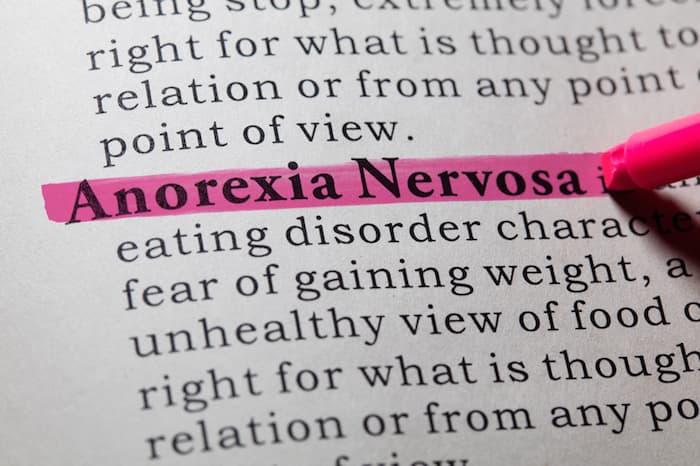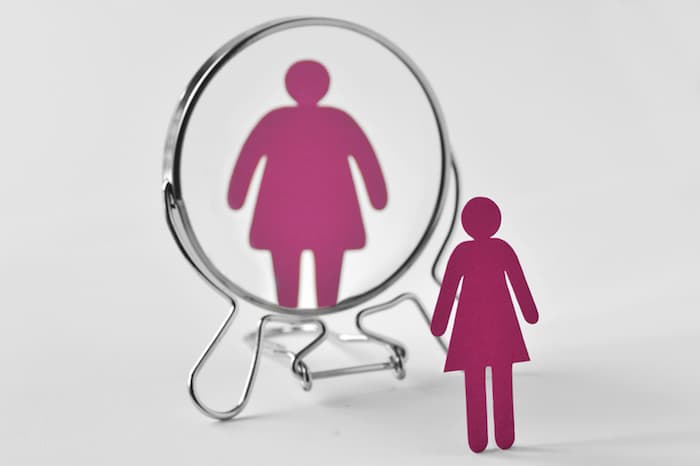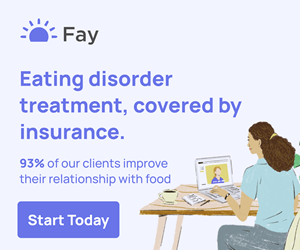- Calls to this hotline are currently being directed to Within Health, Fay or Eating Disorder Solutions
- Representatives are standing by 24/7 to help answer your questions
- All calls are confidential and HIPAA compliant
- There is no obligation or cost to call
- Eating Disorder Hope does not receive any commissions or fees dependent upon which provider you select
- Additional treatment providers are located on our directory or samhsa.gov
What is Anorexia? Symptoms, Complications and Causes
Anorexia nervosa (AN) is a serious eating disorder that can be debilitating to mental, physical, and emotional health and has the highest mortality rate of any psychiatric disorder.3 Still, the condition is treatable, with prompt treatment generally leading to faster recovery, so it’s important to learn the signs, symptoms, and treatment options for anorexia nervosa.
Advertisement
What is Anorexia? A Medical Definition
Anorexia nervosa is a mental health disorder that manifests as a fixation on body shape, weight, or size and an extreme fear of gaining weight, which is generally managed by a severe limitation of food intake. People with this condition also have a distorted body image, imagining themselves to be much physically bigger than they actually are.
Anorexia Definition According to the DSM-5
The condition is officially defined in the Diagnostic & Statistical Manual of Mental Illness (DSM-5), the manual of all clinical mental health diagnoses. The specific criteria for the mental illness include the following:1
- Restriction of energy intake relative to requirements, leading to significantly low body weight in the context of age, sex, developmental trajectory, and physical health.
- Intense fear of gaining weight or of becoming fat, or persistent behavior that interferes with weight gain, even when at a significantly low weight.
- Disturbance in the way in which one’s body weight or shape is experienced.

Additional concerns pointed out by the DSM-5 include the undue influence of body weight or shape on self-esteem and a lack of recognition of the seriousness of losing weight or maintaining a low body weight.1
Dieting Vs. AN
Though the restrictive eating patterns that characterize AN are often similar to dieting behaviors, the two have important differences.
While someone may diet in an attempt to control weight, anorexia nervosa goes much deeper. In many cases, behavior related to AN is an attempt to gain control over one’s life and emotions. Very frequently, it develops as a maladaptive coping mechanism, especially in light of traumatic events or a chaotic environment.
Related Reading
Many people who diet consider losing a certain amount of weight as their goal, while people with AN are generally more motivated by an extreme fear of weight gain and will continue their weight loss attempts even if they are at a dangerously low weight.
Generally, people with AN will exhibit more extreme and consistent thoughts and behaviors around body weight and food than those who are dieting. Still, dieting can be a slippery slope, leading to eating disorder thoughts, behaviors, and full-blown diagnoses.4 In either case, it’s important to develop a healthy relationship with one’s own body and the food one consumes.
Types of Anorexia
Eating disorders are complex conditions, and even when two people struggle with the same diagnosis, they may exhibit very different symptoms. With anorexia nervosa, the criteria laid out by the DSM-5 are primary factors in every case, but several subsets of AN have been identified where those issues present in different ways.

Anorexia Nervosa, Restricting Type
Restricting type is the most commonly understood subtype of anorexia. Individuals diagnosed with restricting type primarily use fasting, extreme diet limitation, and sometimes excessive exercise as a means to control or lose weight.
To officially be diagnosed with this type, a patient cannot have engaged in episodes of binge eating or purging within three months of diagnosis.1
Anorexia Nervosa, Binge-Eating & Purge Type
Those diagnosed with anorexia nervosa binge-purge type also heavily restrict food intake, but they may also engage in binge eating episodes and then utilize behaviors like self-induced vomiting or laxative misuse to compensate.1
The condition is similar to bulimia nervosa, though with AN, binge eating is generally a response to an extremely limited diet, and purging is done to compensate. With bulimia nervosa, different factors motivate binge eating episodes, and dietary restriction is not a primary method for weight control.
Atypical Anorexia Nervosa
Atypical anorexia nervosa (AAN) technically falls under the DSM-5 category of “Other Specified Feeding or Eating Disorder,” which describes conditions that cause significant distress and/or harm but don’t meet the full clinical criteria of a specific diagnosis.
Atypical anorexia nervosa differs from AN in that individuals meet all criteria for anorexia except being severely underweight.2 Since most people associate anorexia nervosa with being underweight, AAN is likely underdiagnosed.
Anorexia Athletica
“Anorexia athletica,” also known as “sports anorexia” or “exercise anorexia,” is not a formal DSM-5 diagnosis. However, it is a phenomenon that is being more widely debated, as many eating disorder researchers and professionals believe its prevalence warrants an official diagnosis.5
Until then, the term remains broad, referring to individuals who engage in excessive or compulsive exercise and do not consume the calories necessary for nourishment to control body shape, weight, or size.

What is Anorexia? Common Signs & Symptoms
As the many types above demonstrate, anorexia nervosa can look a number of different ways and happen to people of any weight, age, gender, or ethnicity.
The truth is, you cannot tell just by looking at someone whether they struggle with anorexia. However, some common signs and symptoms have been identified.
Behavioral & Emotional Signs of Anorexia
Anorexia nervosa has many physical symptoms, but at its core, the condition is a mental health disorder. People who struggle with AN often exhibit behavioral and emotional warning signs, including:6,7
- An intense fear of weight gain or becoming fat
- Emphasis on body weight, size, shape, and appearance that causes apparent distress
- Hyperfocus on food, including nutritional content and bodily impact
- Ritualistic eating patterns such as small/large bites, pushing food around, avoiding certain foods, holding food in cheeks, etc.
- Distorted body image
- Exercising excessively, even when the weather is bad, interferes with job/school/socializing, or injury occurs
- Refusing to eat or be seen eating by others and avoiding eating in social situations
- A pattern of declining to eat, possibly stating that they have “already eaten” and/or “aren’t hungry”
- Mood swings and increased emotion dysregulation
- Difficulty thinking clearly and focusing
Physical Side Effects of Anorexia
Individuals that struggle with anorexia will display specific behavioral and emotional warning signs that indicate a lack of nourishment and mental distress. One of these include:
- Reporting an intense fear of weight gain or becoming fat.
- Emphasis on body weight, size, shape, and appearance that causes apparent distress.
- Hyperfocused on food, including nutritional content, bodily impact, and
- Ritualistic eating patterns such as small/large bites, pushing food around, eating in groups, avoiding certain foods, holding food in cheeks, etc.
- Distorted body image.
- Exercising excessively, even when weather is bad, interferes with job/school/socializing, or injury occurs.
- Refusing to eat or be seen eating by others and avoiding eating in social situations.
- A pattern of declining to eat, possibly stating that they have “already eaten” and/or “aren’t hungry.”
- Mood swings and increased emotion dysregulation.
- Difficulty thinking clearly and focusing.
Long-Term Anorexia Complications
Unfortunately, anorexia nervosa is generally regarded as the most dangerous and deadly eating disorder and can lead to a number of serious medical complications if left untreated, such as:7
- Damage to the structure and function of the heart
- Sudden death
- Arrhythmia, or unusual heart rate
- Brain damage
- Organ damage and/or organ failure
On top of the physical ailments the illness can cause, severe anorexia nervosa is often debilitating to a person’s mental and emotional well-being, resulting in issues with finding or keeping work or maintaining close relationships. Sadly, this can make things feel even more hopeless for the person struggling, making it harder to reach out for help.
Female
1 in 200 women struggle with anorexia nervosa and, if left untreated, can experience long-term consequences such as:
- Loss of menstrual cycle, difficulty conceiving, & possible infertility.
- Damage to the vital organs could result in life-threatening issues.
- Cardiovascular complications & increased risk of heart failure.
- Bone and muscle loss.
- Severe impact on career and relationship functioning.
- Increased symptoms of other mental illnesses such as depression, anxiety, and substance use.
- Death. A study completed by the National Association of Anorexia Nervosa and Associated Disorders found that 5 – 10% of individuals struggling will die within ten years after the onset of the disorder [3]. These statistics vary based on gender identification.
Learn More
Male
The statistical understanding that men experience eating disorders less than women may not be entirely accurate, as men are less likely to discuss their struggles openly. 15% of those struggling with anorexia nervosa identify as male. Long-term consequences of anorexia in men include:
- Damage to the vital organs could result in life-threatening failures to function.
- Cardiovascular complications & increase risk of heart failure.
- Bone and muscle loss.
- Severe impact on career and relationship functioning.
- Increased symptoms of other mental illnesses such as depression, anxiety, and substance use.
- Death. Men with eating disorder diagnoses are at an increased risk of dying as they are often diagnosed later in their disorder due to assumptions that men do not struggle with disordered eating [4].
Learn More

Causes of Anorexia
As with other eating disorders, anorexia nervosa is a complex condition caused by various interlocking psychological, environmental, and biological factors. There is no one cause of the condition, but a number of risk factors have been identified.
Biological Factors
Research is still working to identify specific gene variants related to anorexia nervosa development. Beyond this, a number of biological risk factors are generally agreed upon.
Individuals born with predispositions for perfectionism, rigidity, and sensitivity are more likely to struggle with anorexia. These individuals often utilize these traits to foster dangerous restrictive dieting, eating, and exercise behaviors.8
Additionally, individuals with a first-degree relative who struggled with anorexia nervosa are more likely to develop it.9
Psychological Factors
Individuals with previous mental health diagnoses are more likely to develop eating disorders in general. Each eating disorder has unique relationships with varying co-occurring diagnoses.
Anorexia is commonly seen to co-occur with anxiety disorders as well as obsessive-compulsive disorders.10 The perfectionism and rigidity traits mentioned above also commonly manifest in these co-occurring disorders, which can fuel anorexia tendencies.
Environmental Factors
Several environmental factors can also influence the development of anorexia nervosa.
Western beauty standards—especially the sexual objectification of women—have long been connected to low self-esteem, distorted body image, and eating disorder psychopathology. Some studies have found that certain parenting styles may also influence the likelihood of developing disordered relationships with food.11
Experiencing bullying in childhood has also been linked to a higher rate of developing anorexia nervosa.12 Sadly, many people with AN and other eating disorders have a history of trauma.
How to Treat Anorexia
Anorexia nervosa is a complex condition, and treatment for the disorder is often multi-faceted to address the many various causes that work to maintain it. Often, an AN treatment program will include:
- Psychotherapy, including group and individual therapy
- Nutritional counseling and/or education
- Meal planning and meal monitoring
- Medications, in cases when deemed appropriate
Treatment programs range in intensity from live-in residential to outpatient. A number of individual factors help determine the right type of treatment and level of care.
Additionally, many patients find other programs, strategies, or types of care help them stay recovery-focused in the long run, including:
- Art or dance classes
- Meditation or mindfulness practices
- Positive mantras
- Journaling
- Support group sessions
- Working with charities or nonprofit organizations
Get Treatment Online
In any case, anorexia must be treated once warning signs are recognized for a better chance of achieving long-term recovery. The condition commonly develops in adolescence and young adulthood, so anyone interacting with this population should be particularly vigilant for warning signs.
But it is also important to remember that anorexia nervosa is treatable. An individual can struggle yet receive appropriate treatment and live a life free from food rules, dieting, and restriction and, instead, focused on fulfillment, joy, and recovery.
Resources
- DSM-IV to DSM-5 Anorexia Nervosa Comparison. (2016). Substance Abuse and Mental Health Services Administration. Retrieved September 19, 2024.
- First MB. (2023). What to do about atypical anorexia nervosa? Commentary on Walsh et al. (2023). The International Journal of Eating Disorders; 56(4): 821–823.
- Auger N, Potter BJ, Ukah UV, Low N, Israël M, Steiger H, Healy-Profitós J, Paradis G. (2021). Anorexia nervosa and the long-term risk of mortality in women. World Psychiatry; 20(3):448–449.
- Fan J, Nagata J, Cuccolo K, Ganson K. (2024). Associations between dieting practices and eating disorder attitudes and behaviors: Results from the Canadian study of adolescent health behaviors. Eating Behaviors; 54:101886.
- Vasiliu O. (2023). Current trends and perspectives in the exploration of anorexia athletica-clinical challenges and therapeutic considerations. Frontiers in Nutrition; 10:1214398.
- Warning Signs And Symptoms. (n.d.) National Eating Disorders Association. Retrieved September 19, 2024.
- Eating Disorders: About More Than Food. (n.d.) National Institute of Mental Health. Retrieved September 19, 2024.
- Alexander de Vos J, Radstaak M, Bohlmeijer ET, Westerhof GJ. (2021). Exploring associations between personality trait facets and emotional, psychological and social well-being in eating disorder patients. Eating and Weight Disorders; 27:379-386.
- Pinheiro AP, Root T, & Bulik CM. (2009). The Genetics of Anorexia Nervosa: Current Findings and Future Perspectives. International Journal of Child and Adolescent Health; 2(2):153–164.
- Kaczkurkin AN, Mu W, Gallagher T, Lieblich S, Tyler J, Foa EB. (2021). The Association of Obsessive-Compulsive Disorder, Anxiety Disorders, and Posttraumatic Stress Disorder with Impairment Related to Eating Pathology. Journal of Obsessive-Compulsive and Related Disorders; 31:100685.
- Ramsewak S, Moty N, Putteeraj M, Somanah J, Nirmala LP. (2022). Parenting style and its effect on eating disorders and substance abuse across the young population. Discover Psychology; 2(1):9.
- Copeland WE, Bulik CM, Zucker N, Wolke D, Lereya ST, Costello EJ. (2015). Does childhood bullying predict eating disorder symptoms? A prospective, longitudinal analysis. The International Journal of Eating Disorders; 48(8):1141–1149.



